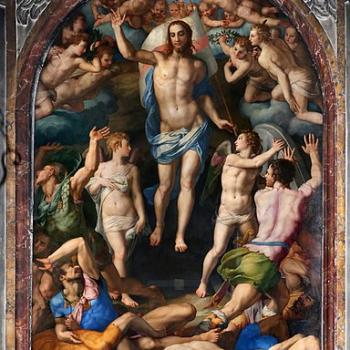Archaeological Support / Sin, Illness, Healing, & Faith / “Word” & “Gospel”

This is an installment of my replies to a series of articles on Mark by Dr. David Madison: an atheist who was a Methodist minister for nine years: with a Ph.D. in Biblical Studies from Boston University. His summary article is called, “Not-Your-Pastor’s Tour of Mark’s Gospel: The falsification of Christianity made easy” (Debunking Christianity, 7-17-19). His words will be in blue below.
Dr. Madison has utterly ignored my twelve refutations of his “dirty dozen” podcasts against Jesus, and I fully expect that stony silence to continue. If he wants to be repeatedly critiqued and make no response, that’s his choice (which would challenge Bob Seidensticker as the most intellectually cowardly atheist I know). I will continue on, whatever he decides to do (no skin off my back).
Dr. Madison believes we are not at all sure whether Jesus in fact said anything recorded in the Gospels. The atheist always has a convenient “out” (when refuted in argument about some biblical text) that Jesus never said it anyway and that the text in question was simply made up and added later by unscrupulous and “cultish” Christian propagandists.
I always refuse to play this silly and ultimately intellectually dishonest game, because there is no way to “win” with such a stacked, subjective deck. I start with the assumption (based on many historical evidences) that the manuscripts we have are quite sufficient for us to know what is in the Bible (believe it or not).
Dr. Madison himself — in his anti-Jesus project noted above, granted my outlook, strictly in terms of practical “x vs. y” debate purposes: “For the sake of argument, I’m willing to say, okay, Jesus was real and, yes, we have gospels that tell the story.” And in the combox: “So, we can go along with their insistence that he did exist. We’ll play on their field, i.e., the gospels.” Excellent! Otherwise, there would be no possible discussion at all.
*****
Dr. Madison called this installment: “A Charming Bible Story… and Its Bad Theology: another installment of the fantasy novel” (3-23-18).
It’s no surprise that Jesus was impressed, seeing a man being lowered through the ceiling: “When Jesus saw their faith, he said to the paralytic, ‘Son, your sins are forgiven.’”
The religious bureaucrats who heard this were shocked: “Now some of the scribes were sitting there, questioning in their hearts, “Why does this fellow speak in this way? It is blasphemy! Who can forgive sins but God alone?” But Jesus would have none of it:
“Why do you raise such questions in your hearts? Which is easier, to say to the paralytic, ‘Your sins are forgiven,’ or to say, ‘Stand up and take your mat and walk’? But so that you may know that the Son of Man has authority on earth to forgive sins”—he said to the paralytic— ‘I say to you, stand up, take your mat and go to your home.’”
Have you been paying attention? If this were anybody else, we would say, “Such a blowhard”—claiming to heal someone to prove he had authority to forgive sins. But that’s a minor point. The implication of this story is that physical affliction is a consequence of sin, and that, once sin is forgiven, the body can be repaired. While we’re charmed by the image of a paralytic being lowered through the roof to reach Jesus, we shouldn’t suspend critical thinking, even though this is a beloved Bible story (well, especially because it is). It would be good to know where this story came from. Those who believe Mark reports “true stories”—i.e., that the gospels are history—never seem to wonder what Mark’s sources were.
To the latter question: presumably from the robust oral tradition of early Christianity: energized by abundant eyewitness testimony. I showed in my previous installment that the tidbit about a sick man being lowered through the roof is supported by archaeology. This was after Dr. Madison ludicrously exclaimed that there was “no way—none at all—to determine if there is any history at all in his [Mark’s] narratives.”
Here’s a little helpful tip to those of you interested in either apologetics or logic and debate in general: don’t assert sweeping universal negatives. It will come back to haunt and embarrass you every time. All I had to do to knock this down was find one example of the Gospel of Mark being supported by secular archaeology and historiography. I found six in one article (in about three minutes of Google searching); and so Dr. Madison’s wild statement was refuted.
As to sin being the reason the man was sick, Jesus refutes this notion elsewhere:
John 9:1-3 (RSV) As he passed by, he saw a man blind from his birth. [2] And his disciples asked him, “Rabbi, who sinned, this man or his parents, that he was born blind?” [3] Jesus answered, “It was not that this man sinned, or his parents, but that the works of God might be made manifest in him.
Luke 13:1-5 There were some present at that very time who told him of the Galileans whose blood Pilate had mingled with their sacrifices. [2] And he answered them, “Do you think that these Galileans were worse sinners than all the other Galileans, because they suffered thus? [3] I tell you, No; but unless you repent you will all likewise perish. [4] Or those eighteen upon whom the tower in Silo’am fell and killed them, do you think that they were worse offenders than all the others who dwelt in Jerusalem? [5] I tell you, No; but unless you repent you will all likewise perish.”
This sort of worthless speculation and thinking was disposed of in the book of Job, many centuries earlier. God describes Job: “there is none like him on the earth, a blameless and upright man, who fears God and turns away from evil” (1:8; cf. 2:3). Yet the entire book is about his extreme sufferings. Obviously, the teaching and “moral” of that book is not that he suffered because of his sins, but rather, in a state of extraordinary holiness. I deal with these sorts of issues regarding healing, in-depth, in my paper, Is It Always God’s Will to Heal?: Biblical Refutation of “Hyperfaith” / “Name-It-Claim-It” Teaching.
One thing we do know is that the thinking reflected here—let’s face it, this is bad theology—has caused a lot of damage. It has seeped into Christian thinking that suffering is one of the ways that God punishes us. How much anguish have people suffered—on top of the pain of illness—because they’re sure that God is getting even with them? Double this anguish if people think that God is hurting others as well, to get even.
Yes, this is false theology (I completely agree), but it’s not the theology of Jesus or the Bible. Dr. Madison states that “The implication of this story is that physical affliction is a consequence of sin” but this doesn’t follow at all. Jesus didn’t say that (and stated the contrary at least twice, as just shown). He simply said to the man, “My son, your sins are forgiven” (Mk 2:5b). He never said that his sins had caused his paralysis. In fact, the immediate context explains why He said that: because He “saw their faith” (2:5a; cf. Mt 9:2; Lk 5:20).
In other words, saying he was forgiven was due to Jesus’ knowledge and observation that he and his friends were faithful: which state brings about forgiveness and absolution (which has nothing to do with his physical condition). This ties into other similar sayings of Jesus when He healed. He is recorded in the Gospels saying no less than six times: “your faith has made you well” (Mt 9:22; Mk 5:34; 10:52; Lk 8:48; 17:19; 18:42).
So yes, it was cool that a disabled man was lowered through the roof to meet Jesus; yes, it was cool that Jesus healed him (or so the story goes). But linking his paralysis with unknown, undisclosed sins was not cool at all.
If that had actually occurred, I would agree, but of course it did not, as just shown. It’s simply another “Madison myth”: one of a great many that I will be exposing and refuting as I proceed through this long (and tedious) series.
We find one of the most famous sayings of Jesus in the next episode in Mark 2. Jesus recruited the tax collector Levi to follow him, then went to his house, where he was in the company of “sinners and tax collectors.” When religious bureaucrats again raised their eyebrows, Jesus replied, “Those who are well have no need of a physician, but those who are sick; I have come to call not the righteous but sinners.” (v. 17) And, rightly so, this is one of the feel-good saying of Jesus.
I appreciate Dr. Madison’s approbation of Jesus. What would we do without it?
But Mark keeps the message vague. At the outset of the chapter, with all those people crammed into Jesus’ house, we read “…he was speaking the word to them.” (v. 2) And now, in the Levi episode, Jesus says that be had come to “call” on certain people. What was “the word,” and what was Jesus calling people to?
The “word” or “word of God” is equivalent in the New Testament to the Gospel and also “true apostolic tradition” (including Old Testament inspired revelation; the Ten Commandments and other tenets of the moral law): the salvation message of God’s free gift of grace, mercy, and salvation through acceptance of Christ’s work on our behalf. Jesus clarifies much of this in chapter 7:
Mark 7:5-13 And the Pharisees and the scribes asked him, “Why do your disciples not live according to the tradition of the elders, but eat with hands defiled?” [6] And he said to them, “Well did Isaiah prophesy of you hypocrites, as it is written, `This people honors me with their lips, but their heart is far from me; [7] in vain do they worship me, teaching as doctrines the precepts of men.’ [8] You leave the commandment of God, and hold fast the tradition of men.” [9] And he said to them, “You have a fine way of rejecting the commandment of God, in order to keep your tradition! [10] For Moses said, `Honor your father and your mother’; and, `He who speaks evil of father or mother, let him surely die’; [11] but you say, `If a man tells his father or his mother, What you would have gained from me is Corban’ (that is, given to God) — [12] then you no longer permit him to do anything for his father or mother, [13] thus making void the word of God through your tradition which you hand on. And many such things you do.” (cf. Mk 4:14-20, 33: eight usages of “the word”)
“The gospel” also appears in Mark eight times (1:1, 14-15; 8:35; 10:29; 13:10; 14:9; 16:15). It’s simply the summation of Jesus’ message, seen throughout the book.
Read the gospel of Mark carefully—and what’s missing? There is little focus at all on ethical teaching. Jesus’ primary message in Mark is the soon-to-arrive Kingdom of God…which never arrived.
I thoroughly dealt with this charge about the kingdom never arriving in the last installment.
So, bottom line: “the word” was probably not moral teaching; Jesus was calling people to commit to his delusion.
It was the gospel, etc., as just explained.
The Son of Man didn’t descended [sic] through the clouds, as was so enthusiastically promised and predicted as well by the apostle Paul. This is one of the big New Testament failures that the church has had to finesse.
Sheer nonsense. These false charges have been dealt in another one of my numerous refutations of Dr. Madison.
Somehow, the idea that abstaining from food, as a way to get right with God, has gained traction in multiple religious traditions.
Fasting and abstinence was long established part of the Jewish religion: continued on into Christianity (especially during Lent). It’s not complicated: the idea is heroic renunciation of good (in and of themselves) physical things in order to concentrate more intensely on spiritual things.
We read in Mark 2:18 that the disciples of John the Baptist fasted—no surprise there, since he was known for his asceticism; but the Pharisees also saw fasting as an essential component of piety. Asked why his disciples didn’t go along with the practice, at least for the present:
“Jesus said to them, ‘The wedding guests cannot fast while the bridegroom is with them, can they? As long as they have the bridegroom with them, they cannot fast. The days will come when the bridegroom is taken away from them, and then they will fast on that day.’”
There is a time for everything under the sun (Ecc 3:1-8).
With this Jesus script, Mark introduces a theme that will be developed later, especially in Matthew 25:1-13, i.e., the Parable of the Ten Virgins. There, Jesus displays a nasty streak in his role as the bridegroom. This motif is part of Mark’s message about the coming Kingdom of God.
I fail to see what is “nasty” about the parable. The moral is that we must be wise with the gifts and graces that God has given us. If not, we may be lost in the end (“the door was shut”: 25:10). The choice is ours. It’s no more “nasty” for God to judge disobedience to His laws (and for Jesus, Who is God, to teach this in His parables) than it is for earthly judges to judge disobeying of legislative laws. It’s just silly to insinuate otherwise.
In the final episode of Mark 2 we find another famous Jesus pronouncement: “And he said to them, ‘The sabbath was made for man, not man for the sabbath.’” (v.27) In this scene Jesus had been criticized because his disciples had been plucking grain on the Sabbath, which amounted to doing work. Hey, kudos to Mark/Jesus for this bold statement. This is a progressive outlook, after all, i.e., religious rules are made for the benefit of people, who are not created to conform to divine edict.
But here’s an interesting twist: when Matthew and Luke copied this story, they deleted verse 27…just skipped right over it! Seems they preferred a less radical Jesus. (…so you see, all four gospel writers make Jesus say what they want him to say). But all three synoptic authors included Jesus’ claim in verse 28: “…the son of man is lord even of the sabbath.”
If three people set out to write the same story, they will all include some common details and also have some exclusive to their story which aren’t in the others. This is a no-brainer and a non-starter. The essence of what was being talked about is present in all three accounts. No need to get conspiratorial. But then, what would “atheist exegesis” [choke / cough] be without this sort of inane foolishness?
The same people who habitually (almost by nature) complain and lie about the evangelists and other Bible writers (including Jesus) supposedly lying constantly and conspiring all over the place, constantly do precisely that in their own polemics. This is but one of innumerable unproven, arbitrary examples in Dr. Madison’s ongoing sophistry. How ironic and sad, huh?
***
Photo credit: The Disciples Eat Wheat on the Sabbath, by James Tissot (1836-1902) [public domain / Wikimedia Commons]
***

















